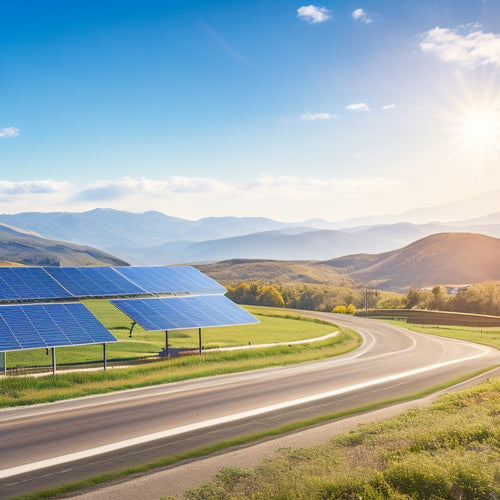
What Homeowners Need to Know About Energy Independence
Share
You're taking the first step towards energy independence, a voyage that can greatly reduce your reliance on non-renewable resources and enhance your financial planning. By understanding solar panel systems, choosing the right panels for your needs, and considering installation and maintenance tips, you'll be well on your way. You'll also want to investigate energy storage and battery options, government incentives, and cost savings strategies to maximize your investment. As you maneuver through the world of energy independence, you'll uncover that every detail counts, and making informed decisions will be essential to achieving your goals - and there's still more to investigate.
Overview
- Energy independence offers financial benefits, energy savings, and increased energy security through reduced reliance on non-renewable resources.
- Solar panel systems convert sunlight into electricity, and understanding types, efficiency, and durability is crucial for informed decisions.
- Choosing the right solar panels depends on efficiency ratings, installation type, and consideration of temperature coefficient and maximum power output.
- Energy storage and battery options, such as solid-state batteries and lithium-ion innovations, enable backup power and smart grid functionality.
- Government incentives, financing options, and energy audits can help offset upfront costs and prioritize upgrades for maximum return on investment.
Benefits of Energy Independence
Enjoying control over your energy consumption and costs is just the beginning of the benefits of energy independence.
You'll also experience significant energy savings, reducing your reliance on non-renewable resources and minimizing your environmental impact.
With energy independence, you'll have increased energy security, shielding you from price fluctuations and grid outages.
By having energy autonomy, you'll be able to manage your energy efficiently and break free from grid reliance, nurturing community pride and ownership through shared energy initiatives.
Plus, you'll see a cost reduction in your utility bills, freeing up money for other important expenses.
By utilizing renewable resources, you're investing in a sustainable living future and increasing your home value in the long term.
Additionally, you're contributing to grid resilience, making your community more energy self-sufficient.
Understanding Solar Panel Systems
As you consider energy independence, understanding solar panel systems is essential to utilizing the power of renewable energy. Solar panels convert sunlight into electricity, reducing your reliance on the grid. There are several types of solar panels, each with its own benefits and drawbacks.
| Solar Panel Type | Efficiency | Installation Cost |
|---|---|---|
| Monocrystalline | 15-20% | $2.50-$3.50 per watt |
| Polycrystalline | 12-15% | $2.00-$3.00 per watt |
| Thin-Film | 7-14% | $1.50-$2.50 per watt |
| Bifacial | 18-22% | $2.80-$4.00 per watt |
| Perovskite | 18-24% | $3.00-$5.00 per watt |
When choosing a solar panel system, consider factors such as installation costs, energy efficiency, and durability. By understanding the different options available, you can make an informed decision that suits your energy needs and budget.
Choosing the Right Solar Panels
You'll want to select solar panels with high efficiency ratings, as they can generate more power per hour of sunlight, making them a better value in the long run.
For instance, high-efficiency silicon solar cells can achieve conversion rates over 26% high-efficiency silicon solar cells, making them suitable for off-grid systems.
When choosing the right solar panels, you'll also need to take into account the installation type that best suits your needs, whether that's a standard roof-mounted system or a more versatile ground-mounted option.
Panel Efficiency Matters
Most homeowners investing in solar energy systems understand that the quality of their solar panels plays an essential role in generating maximum electricity from available sunlight.
You should pay attention to panel efficiency, as it directly affects your system's overall performance. Efficiency ratings, usually expressed as a percentage, indicate how well a panel converts sunlight into electricity.
Look for high-efficiency panels with ratings above 20%, which can boost energy output by up to 45% via optimized angles and tilt, and are ideal for homes with limited roof space and budget constraints. These will provide more power per hour of sunlight, making the most of your investment.
When evaluating panel performance, consider factors like temperature coefficient, fill factor, and maximum power output.
Installation Type Options
Your solar panel installation's performance hinges on the type of panels you choose, and the installation method you select. You have several options to evaluate.
For off-grid systems, you'll need a battery backup to store excess energy. Grid-tied options, on the other hand, allow you to sell excess energy back to the grid. Hybrid installations combine both approaches.
If you're handy, you might opt for a DIY installation, but professional services can guarantee a more efficient and code-compliant setup.
Mounting solutions vary, including roof-mounted, ground-mounted, and tracking systems. System sizing depends on your energy needs and available space.
Be certain to research local zoning regulations and financing options before committing. Consult with local contractors to determine the best approach for your unique situation.
Installation and Maintenance Tips
Installing a renewable energy system requires careful planning and execution to guarantee peak performance and longevity.
You'll want to verify your system design is customized to your specific energy needs and local climate.
During installation, make sure all components are properly secured and connections are tight.
Regular maintenance is vital to prevent system downtime and optimize energy production.
Schedule routine checks to inspect for signs of wear, clean panels, and verify electrical connections.
Keep a maintenance log to track performance and identify potential issues early.
Energy Storage and Battery Options
As you consider energy independence, you'll want to investigate the latest energy storage and battery options to guarantee a reliable power supply.
You've got several choices, including advanced battery technologies that can store excess energy generated by your system, power backup systems that kick in during outages, and energy storage solutions that optimize your energy usage.
Battery Technology Advancements
With the rise of renewable energy sources, homeowners are increasingly looking for reliable and efficient ways to store excess energy generated by their solar panels or wind turbines, and battery technology has emerged as an essential component in achieving energy independence. As you investigate energy storage options, you'll want to reflect on the latest battery technology advancements.
| Battery Type | Description |
|---|---|
| Solid State Batteries | Replacing liquid electrolytes with solid materials, these batteries promise enhanced safety, energy density, and charging speeds. |
| Lithium Ion Innovations | Ongoing research aims to improve lithium ion battery efficiency, lifespan, and affordability, making them a more viable option for homeowners. |
| Advanced Flow Batteries | These batteries store energy in liquid electrolytes in external tanks, offering scalable, long-duration energy storage for your home. |
Power Backup Systems
Several key considerations come into play when designing a power backup system for your home, and selecting the right energy storage and battery options is essential to achieving reliable, uninterrupted power during outages or grid failures.
You'll want to guarantee your system integrates seamlessly with your existing energy infrastructure, allowing for smooth changes between grid power and backup power. This requires careful consideration of system integration, including the type and size of energy storage, inverter capacity, and power conditioning.
Energy Storage Solutions
Reliability hinges on the right energy storage solutions, and for homeowners seeking energy independence, selecting the ideal energy storage and battery options is essential.
You'll want to contemplate energy storage systems that seamlessly integrate with your renewable energy sources, such as solar or wind power. Look for solutions that enable smart grid functionality, allowing you to optimize energy distribution and reduce your reliance on the grid.
When choosing a battery, contemplate factors like depth of discharge, cycle life, and compatibility with your existing infrastructure.
Incentives and Cost Savings
Government-backed incentives and utility rebates can greatly offset the upfront cost of shifting to renewable energy sources, making energy independence more accessible to homeowners like you.
You can take advantage of federal incentives, such as tax credits, to reduce your tax liability. Additionally, state rebates and local utility programs can provide further savings. Financing options are also available to help spread the cost over time.
Before making any upgrades, consider conducting an energy audit to identify areas of improvement. A thorough cost analysis will help you prioritize home upgrades, maximizing your return on investment.
Frequently Asked Questions
Can I Use Energy Independence in Areas With Frequent Power Outages?
You can achieve energy independence even in areas with frequent power outages by investing in off-grid solutions and backup systems, ensuring you're not reliant on the grid and can keep your lights on when the power goes out.
How Does Energy Independence Impact Property Value and Resale?
As you illuminate your estate with candles, à la 18th century aristocracy, you'll be thrilled to know that energy independence enhances property value through property appreciation, driven by market demand for self-sustaining homes that grant you freedom from the grid.
Can I Use Energy Independence With Other Renewable Energy Sources?
You can combine energy independence with other renewable sources, like solar integration, to optimize energy generation and storage. By incorporating battery storage, you'll guarantee a reliable, self-sustaining energy system that maximizes your freedom from the grid.
Will Energy Independence Work With My Existing Electrical System?
Like a puzzle piece fitting perfectly, your existing electrical system can seamlessly integrate with energy independence solutions, ensuring grid compatibility and system integration, so you can enjoy the freedom to generate and manage your own power, on your own terms.
Do Energy Independence Systems Require Special Insurance Coverage?
You'll likely need specialized insurance coverage for your energy independence system, such as equipment breakdown or renewable energy insurance, which can add 5-15% to your annual premiums, depending on the insurance types and coverage costs you choose.
Ready to Buy
As you stand on the threshold of energy independence, imagine a future where your home is an island of self-sufficiency, untethered from the grid and generating its own clean power. With the right solar panel system, energy storage, and maintenance, you'll be swimming in a sea of savings and basking in the glow of sustainability. Take the leap and join the ranks of the energy-independent – your wallet and the planet will thank you.
Related Posts
-

Top Eco-Friendly Camping Equipment for a Sustainable Adventure
When you're camping with the planet in mind, opt for eco-friendly gear like tents made from recycled materials and bi...
-

Is Switching to Green Energy Solutions Easy
Switching to green energy solutions isn't just easy; it's also beneficial. You can greatly cut utility costs and enjo...
-

Replacing Old Appliances With Sustainable Alternatives
Replacing old appliances with sustainable alternatives can change your home into an energy-efficient space. Not only ...


